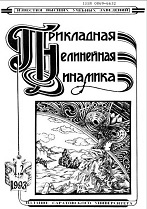|
APPLIED PROBLEMS OF NONLINEAR OSCILLATION AND WAVE THEORY
Optimal data-driven models of forced dynamical systems: general approach and examples from climate
D. N. Mukhin, A. F. Seleznev, A. S. Gavrilov, A. M. Feigin
Federal research center Institute of Applied Physics
of the Russian Academy of Sciences, Nizhny Novgorod, Russia
Abstract:
Purpose. Purpose of this article is to review recent results (over the past three years) obtained at the Institute of Applied Physics (IAP RAS) relating of applications of the method for constructing optimal empirical models to climatic systems. Methods. This method, developed by the authors of the article, includes the construction of reduced models of the system under study in the form of random dynamical systems. In combination with Bayesian optimization of the model structure, this method allows us to reconstruct statistically justified laws underlying the observed dynamics. Results. The article describes results of applying this method to modeling three climatic subsystems corresponding to different time scales: the Pleistocene climate characterized by glacial cycles, El Nino - Southern Oscillation in the modern climate - a phenomenon with a scale of the order of a year, and the climate of the tropical Pacific Ocean on a centennial scale. Conclusions. Based on the presented results, it can be concluded that the method used for constructing optimal models is a useful tool for verifying the mechanisms underlying the observed climatic variability, e.g., analyzing the response of the system to external signals.
Keywords:
data-driven models, random dynamical systems, inverse modeling, time series analysis, climate modeling.
Received: 31.05.2021
Citation:
D. N. Mukhin, A. F. Seleznev, A. S. Gavrilov, A. M. Feigin, “Optimal data-driven models of forced dynamical systems: general approach and examples from climate”, Izvestiya VUZ. Applied Nonlinear Dynamics, 29:4 (2021), 571–602
Linking options:
https://www.mathnet.ru/eng/ivp436 https://www.mathnet.ru/eng/ivp/v29/i4/p571
|

|




 Contact us:
Contact us: Terms of Use
Terms of Use
 Registration to the website
Registration to the website Logotypes
Logotypes








 Citation in format
Citation in format 